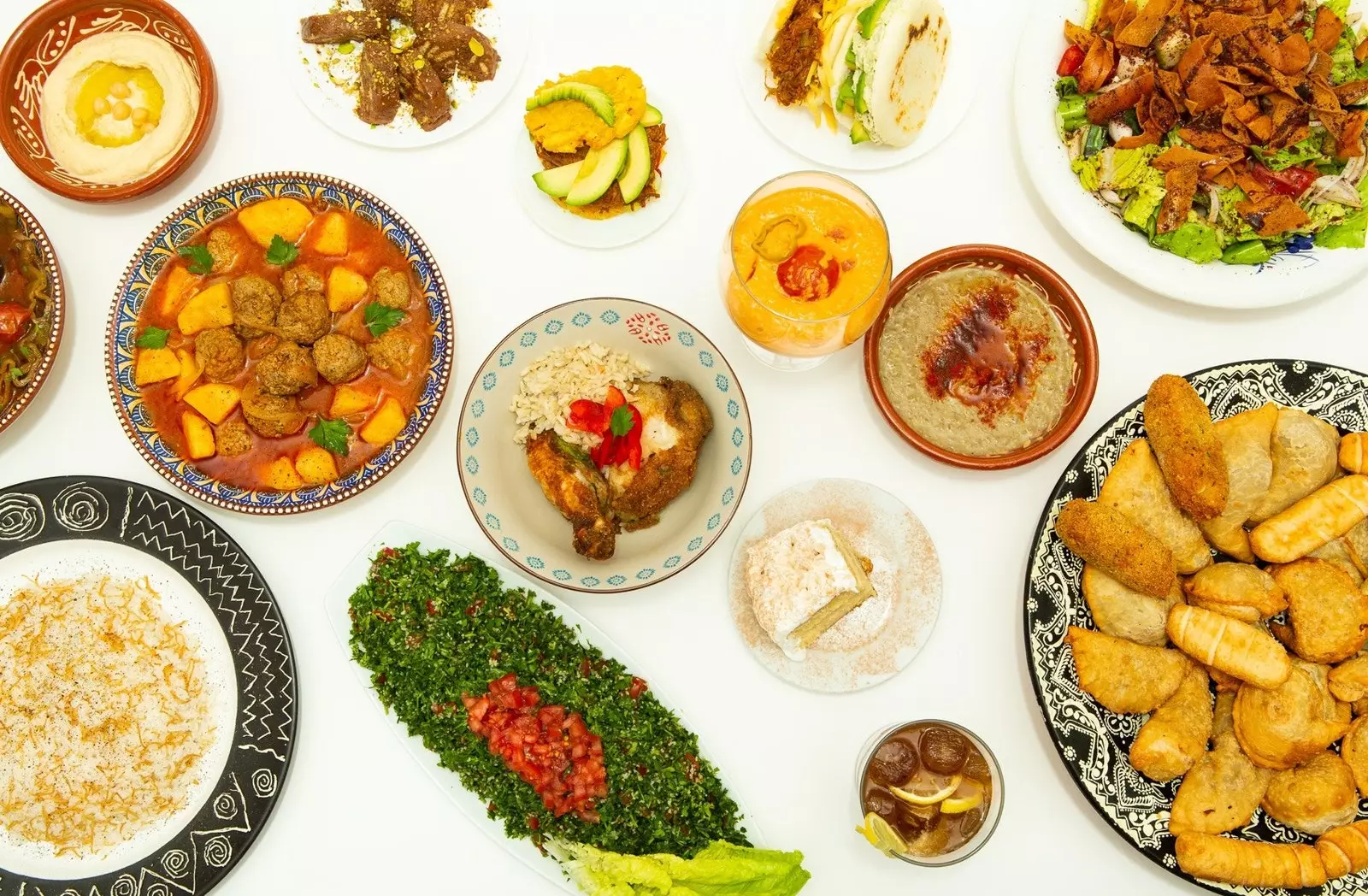
Refusion Delivery: the kitchen from which a group of young refugees change the world
I arrive on a rainy Friday afternoon to a small place in the Tetouan neighborhood of Madrid . I ring the doorbell and it opens Alex, with joy in his eyes . They have loud music on because they are focused on cooking. focused but fun . At the end of the corridor, which has some tables used to receive clients, is the kitchen.
When I enter, everyone greets enthusiastically but they don't stop for a second. They are chopping peppers, making a parsley-garlic sauce, and slicing chicken. They are four. Hello, Dani, Alex and Souhaeb. Syria, Venezuela, Sudan and Morocco , respectively. All under 30 years old and with a history of overcoming behind their backs. But they share, above all, the desire to learn, to do, to live.
Together they form the template of Refund Delivery (Captain Blanco Argibay Street, 65,), a project of gastronomy that unites Syrian, Venezuelan and Sudanese cuisine , and that aims to transform the lives of the people who are part of it through food. An utopia? We assure you not.
REFUSION DELIVERY
Refusion Delivery is born from the association Madrid for Refugees , in which cooking classes were taught and solidarity menus were prepared. Its success led the current partners of refusal to think that there was the possibility of create a company, not an NGO —they point out—, self-financing and was able to employ the same refugees who had been part of the Association.
The five founding partners have other jobs and they dedicate their free time to making the project work with the aim of making it economically viable . “We are a limited labor company in which the partners also work and the idea is that in the long term the refugees who cook now can also become partners in the company, and that this continues to expand and we reach a lot of places in all parts…”, he tells me Elena Suarez , one of the five project partners.
They started in May 2019 and initially they wanted to be solo delivery , but the good reception in the neighborhood pushed them to They will transform their small premises into a restaurant where they can receive their clients.
THE PURPOSE
When I ask Elena about the purpose of the project, she is clear: “ give refugees who like cooking the chance to have a stable job, paid by agreement ...and through that employment stability , you also realize that it is emotional sometimes, because we are a small family. And that causes the integration capacity of these people to be much greater.”
It's never just work, like it's not just a plate of food either . Through the recipes they seek to transmit their own culture and believe that it can be essential for society to begin to break down taboos. They want that the image of a refugee changes through gastronomy . "If you eat a sudanese kufta maybe the next time you hear about Sudan, you will remember that spicy peanut sauce and associate it with a good experience. Eating is an approach to another culture” says Elena.
If you ask them about their biggest milestone, Elena does not hesitate to say that it is the fact that having formed a great team and making a meal that is really delicious . They have managed to unite very different cultures and now the gears work perfectly.
GASTRONOMY AS THE BACKGROUND OF A SOCIAL PROJECT
As the name suggests, Refusion mixes the three cultures, you don't cook them . All its chefs work with dishes from the three countries, but the recipes are not modified. The original ingredients are preserved and they go through Madrid in search of the spices, oils and other products they need.
Its dishes speak of its origins and, therefore, Hala, the head chef , who fled the war in Syria 7 years ago, she tells me, in perfect Spanish, that everyone turns to their mothers or grandmothers before preparing each recipe or if they have any questions, because they want to respect the processes as much as possible. “ We're trying to get homemade stuff out of this kitchen , authentic, rich, healthy, that have a flavor of our countries… ”she points out.
You can find hummus, fatoush, empanadas, tequeños, falafels … Lots of vegetarian options and some surprises like the Hurak Bi Isbau which literally means "the one who burned his finger". Lentils and wheat dough with pomegranate sauce dressing and spices. Direct from Damascus and spectacular.
Our advice? That you try (minimum) one dish of each.
THE CHEFS
If you ask them what food means to them, Dani, 22-year-old Venezuelan , anticipates: “A way of telling someone what we feel, without speaking. It is a way of being closer to home and if another person who does not know much about our culture , tells us that something is delicious, for me it is a lot”.
Alex is the queen of falafels . This 24-year-old Sudanese woman fled her country because of her transsexuality and cooked in the street until she found out about the project. Somewhat shy, she confirms that she is, that she is very good at it and that she continues to learn to cook because she loves it. "He's missing the crown," Hala says quickly.
Hala herself tells me precisely how she organizes herself: some in the front with the cold ones and others in the kitchen to carry out the bulk of the orders . The hard part at first was learn recipes from other countries and other forms of cooking, but once that initial challenge is overcome, the young Syrian loves to make the stuffing for the patacones and Dani, a Venezuelan, begins to deftly pronounce the Sudanese dishes.
“Diversity is a privilege ” Hala finishes. And yes, we can also hug her while eating.
